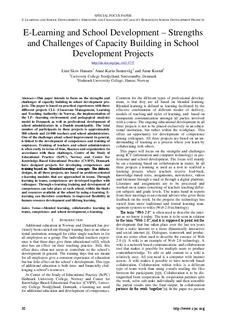E-learning and School Development - Strengths and challenges of capacity building in school development
Journal article, Peer reviewed
Permanent lenke
http://hdl.handle.net/11250/134408Utgivelsesdato
2011Metadata
Vis full innførselSamlinger
Sammendrag
This paper intends to focus on the strengths and challenges of capacity building in school development projects. The paper is based on practical experiences with three different projects CLL (Classroom Management, Learning and Teaching Authority) in Norway, the implementation of the LP- (learning environment and pedagogical analysis) model in Denmark as well as professional development of school administrators in a Danish municipality. The total number of participants in these projects is approximately 500 schools and 24 000 teachers and school administrators. One of the challenges about school improvement in general, is linked to the development of competences and training of employees. Training of teachers and school administrators is often costly in terms of time, finances and organization. In accordance with these challenges, Centre of the Study of Educational Practice (SePU), Norway and Centre for Knowledge-Based Educational Practice (CVIPP), Denmark have designed projects for developing competences and training based on “blended learning” concepts. The didactic designs, in all three projects, are based on problem-oriented e-learning modules that are approached in teams. Through learning in teams, competences are developed together with colleagues. Through e-learning training and development of competences can take place at each school, within the limits and resources available at the school by using e-learning. E-learning can therefore contribute to improved flexibility in human resource development and lifelong learning.
